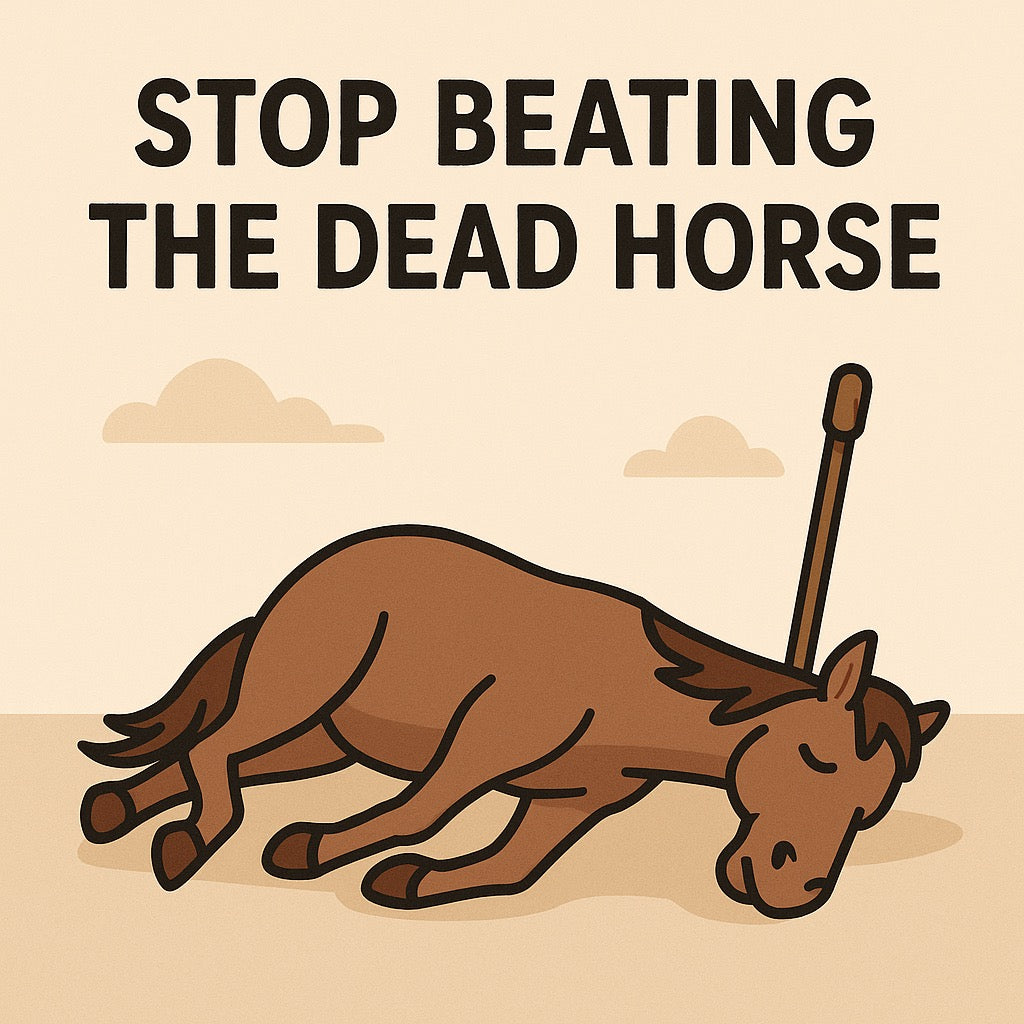
Stop Beating the Dead Horse: What People and Teams Deserve Instead
Share
🐴 Stop Beating the Dead Horse: People Deserve Better Than Stagnation
There’s this old metaphor called the Dead Horse Theory.
It says:
“When you discover you're riding a dead horse, the best strategy is to dismount.”
But in real life — whether at work, in teams, in relationships, or in leadership — we almost never do that.
We keep going.
We convince ourselves it’s just tired, not dead.
We upgrade the saddle.
We start a committee.
We give pep talks to the horse.
We launch a rebranding.
We do everything… except get off the damn horse.
Why Do We Keep Riding?
Because letting go is hard.
It requires honesty.
It asks us to admit that what we’re holding on to might no longer be working — or never worked to begin with.
And that’s scary. Especially when we’ve already invested time, energy, status, identity.
We rationalize. We defend our investment. We tell ourselves: "Maybe it just needs more time. More effort. More alignment."
But here's the raw truth:
Dead horses don’t come back to life.
No matter how much we care. No matter how hard we try.
The longer we ride, the more drained we get. And what started as optimism turns into obligation. We’re not progressing anymore — we’re just dragging weight.
The Blame Game: When the Story Becomes More Important Than the Truth
When something ends — a project, a team dynamic, a relationship — we crave a clean story. We look for someone to blame.
Because if someone is the problem, we don’t have to rethink the system.
This shows up everywhere:
In companies:
“This team is toxic because of that manager.”
But the real issue is lack of trust, bad structure, unclear values.
In teams:
“We failed because João didn’t deliver.”
Nope — we failed because roles were messy, deadlines were fake, and no one felt safe to speak up.
In relationships:
“It ended because they found someone else.”
It didn’t. It ended because intimacy, communication, or care had eroded — long before anyone had the courage to name it.
In leadership:
“We lost talent because they weren’t committed.”
Or… maybe you never gave them space, growth, or recognition. And they finally got tired of riding a dead horse too.
We love simple stories. Villains and victims. But most breakdowns aren’t caused by monsters. They’re caused by silence, fear, and slow erosion over time.
When blame replaces reflection, we don't evolve — we just repeat.
Holding On Can Wreck You
Keeping yourself tied to something dead — a job, a method, a dynamic, a story — doesn’t just slow you down.
It drains you.
Kills your creativity.
Makes you small.
You stop feeling joy. You start performing survival.
You stop building new ideas and start managing old damage.
You feel responsible for keeping the horse upright, even though it's been flatlined for ages. You call it loyalty. Others call it burnout.
The longer you pretend it still works, the more you lose sight of what could be built instead.
The Brave Move: Burn the Saddle
Letting go isn’t failure.
It’s a reset.
It’s saying: “This no longer serves me, and I refuse to keep dragging it.”
It might be walking away from a leadership role that’s become a cage.
It might be ending a relationship that only functions through blame.
It might be leaving a team that no longer grows.
It might mean challenging a system you helped build. It might mean saying goodbye to a version of yourself that settled for too little.
Whatever it is — walking away is sometimes the most powerful form of loyalty you can show to yourself.
Burning the saddle doesn’t mean burning the past. It means releasing the illusion that it still fits the journey ahead.
Final Reflection
If you’re constantly being blamed, maybe it’s not you — maybe you’re just the easiest one to blame.
If you’re feeling stuck, maybe it’s not burnout — maybe it’s grief over a horse you already know is dead.
People deserve better. So do you.
